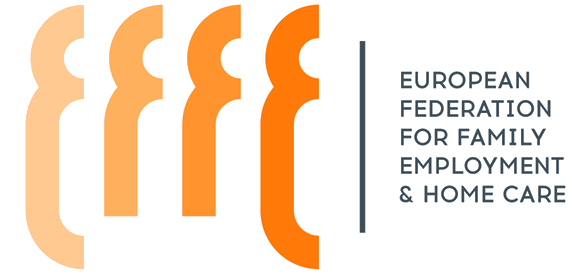
EFFE’s President Marie Béatrice Levaux gave a speech in the course of last June 14 Digital Assembly 2019 in Bucharest, Romania, to introduce tomorrow’s new jobs.
The forum was jointly organized by the European Commission and the Romanian Presidency of the Council of the European Union and was the opportunity for stakeholders to take the digital single market’s latest achievements into consideration as well as to draw conclusions out of it and to share new ideas about a common future digital policy in the EU.
The venue has also been a privileged time to show how digital transforms our society and economies – inasmuch as how it can positively affect our daily lives.
The President’s intervention took place in the “digital4jobs” round table alongside other high level speakers, and was a time not only to raise the impact of digitalization on domestic employment in Europe but also to foster new uses of digital technologies in order to professionalize the sector and fight undeclared labor.
She therefore recalled that the most recent 2018 estimations peaking at 8 million declared domestic workers in the EU i.e. 4% of total employment volume was only ever way below reality considering the share of undeclared workers – reckoned by the Commission between 50% and 70%. That would make up an average 8 to 10 million workers deprived from any social rights.
The sector is all the more essentially composed of female workers, with a considerable 91% share of workers being women. This makes up about 7.5% of total female employment. Besides, 50% of domestic employees stem from a legally or illegally migrated background.
The President has consequently discussed digital declaration platforms in a first place, and praised their incentive role in the declaration of domestic work. As a matter of fact, simplifying and accelerating declaration proceedings are substantial levers to declaration all the more when they come with financial support arrangements encouraging the creation of new domestic jobs – which is their first and primary goal.
Such an online declaration platform will immediately transform monthly declaration acts into comprehensive statistical databases on the sector’s activity. It will also endorse the role of an observatory, able to analyze the average working conditions in the sector, to simulate the impact of related legal dispositions over national finances, and also to look thoroughly into the efficiency of policies and to identify to what threshold households cease to declare their domestic employee.
Digital work declaration tools are all the more efficient that they not only generate new virtuous declarative uses that benefit both economically and socially but also provide public decision-makers with new means to assess and improve their ways.
On a second hand, the President stressed out that the domestic employees’ skills shall be reinforced with new digital skills in order to increase the quality of related jobs.
The digital transition requires to update the usual manner to interact socially as much as with one another or with other generations. Essentially focused on interpersonal relations, domestic employment sector is under constant evolution and its various jobs are transforming according to the use of new technologies. Social links and new solidarities emerging are fundamental to the social cohesion and public health.
Hence, domestic employment not only provides for support but also fosters intergenerational connections. Senior people are taught their employee’s digital skills and in return, transmit their knowledge to their domestic help. That is how domestic employment turns out to be a vector of knowledge between generations.
Recent research has proven that a fair share among the increasing amount of elderly in Europe could be encouraged to using modern online services, IT tools and assistance to autonomous life, therefore significantly improving their domestic quality of life.
Carers and other supporting staff embody the “missing link” between digital tools and the cared for. That assertion has been the starting point to the European project “Carer+”. On one part, social workers and carers in Europe are mainly lowly IT-skilled and often need to go through training digital courses to improve the quality of the services they deliver as well as the professionalization process and their abilities – so as to turn them into new job opportunities. On the other hand, once they have acquired the necessary ICT skills for home care, they can effectively meet the transmission, adaptation and comprehension requirements to introduce digital tools and appropriate options in private houses. The latter can thus acquire digital skills from their caregivers and become familiar with the tools and related devices that improve active aging and their quality of life. This is the basic premise of the “Carer+” European project that has identified and developed the digital inclusion skills that are essential for social workers and informal caregivers (establishing a “digital skills framework”), making at their disposal a set of pedagogical paths and resources that have responded to the major challenges of their professionalization: isolation, lack of access to technologies, lack of flexibility in study methods, lack of support and motivation, no accreditation official, no recognition of previous experience and lack of scalability. If it becomes quite clear that home trades will not be replaced by technologies, robots, digital applications, e-health and uberisation question once more the linking of people and ultimately should allow workers to broaden their field of competences and to prove their human irreducibility.
Share
A social Europe that works for every home